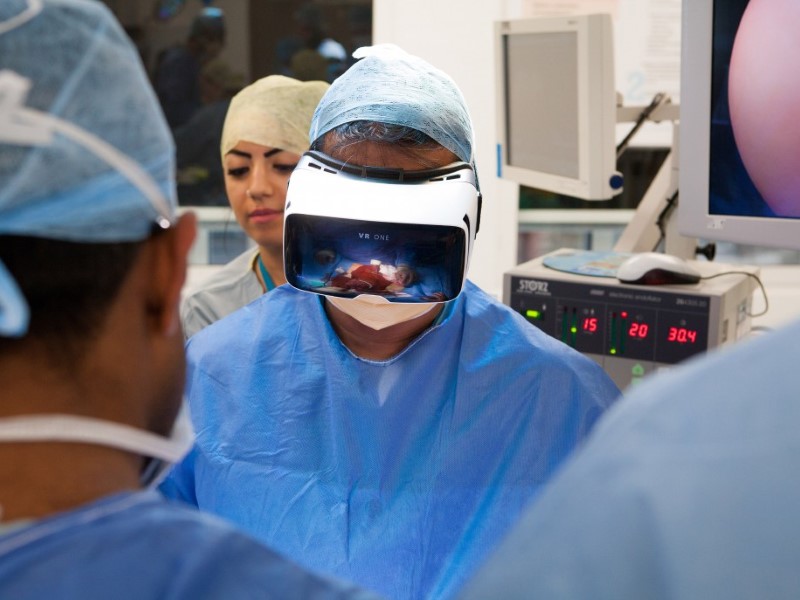- Home
- Science
- Science News
- Royal London Hospital Live Streams Cancer Surgery in Virtual Reality
Royal London Hospital Live-Streams Cancer Surgery in Virtual Reality

Carried out by the leading cancer surgeon Dr. Shafi Ahmed, the entire procedure was watched live by medical students from the hospital and Queen Mary University Hospital though Google Cardboard VR headsets and smartphones, London-based newspaper Evening Standard reported on Friday.
The hospital achieved this feat with a collaboration with the healthcare firm Medical Realities run by Dr Ahmed. The firm offers medical training products, specialising in virtual reality, augmented reality and serious games. The livestream was powered by the 360-video firm Mativision.
"I am honoured that this patient has given permission for his experience to provide this unparalleled learning opportunity," Dr Ahmed was quoted as saying.
People also watched the livestreaming by downloading an app on their smartphones. The operation was filmed on two 360 degrees cameras with multiple lenses.
"As a champion of new technology in medicine, I believe that virtual and augmented reality can revolutionise surgical education and training, particularly for developing countries that don't have the resources and facilities of NHS hospitals," Dr Ahmed added.
In 2007, Dr Ahmed was appointed as a consultant general, colorectal and laparoscopic Surgeon at Barts Health and the London NHS trust.
In 2014, he performed the world's first live-stream of an operation using Google Glass which was watched live by nearly 13,000 students around the world.
The live surgery on the colon cancer patient was the joint effort from Barts Health, Medical Realities and Mativision.
According to a recent research, the VR technology can also be used to determine how people perceive their bodies, to treat body image disturbances, and to improve adherence to physical activity among obese individuals.
"Virtual reality offers promising new approaches to assessing and treating people with weight-related disorders, and early applications are revealing valuable information about body image," said Giuseppe Riva, Universita Cattolica del Sacro Cuore in Milan, Italy, and José Gutiérrez-Maldonado from University of Barcelona, Spain.
An immersive VR therapy can also help people with depression by making them less self-critical and more compassionate towards themselves.
Catch the latest from the Consumer Electronics Show on Gadgets 360, at our CES 2026 hub.
Related Stories
- Samsung Galaxy Unpacked 2025
- ChatGPT
- Redmi Note 14 Pro+
- iPhone 16
- Apple Vision Pro
- Oneplus 12
- OnePlus Nord CE 3 Lite 5G
- iPhone 13
- Xiaomi 14 Pro
- Oppo Find N3
- Tecno Spark Go (2023)
- Realme V30
- Best Phones Under 25000
- Samsung Galaxy S24 Series
- Cryptocurrency
- iQoo 12
- Samsung Galaxy S24 Ultra
- Giottus
- Samsung Galaxy Z Flip 5
- Apple 'Scary Fast'
- Housefull 5
- GoPro Hero 12 Black Review
- Invincible Season 2
- JioGlass
- HD Ready TV
- Laptop Under 50000
- Smartwatch Under 10000
- Latest Mobile Phones
- Compare Phones
- Red Magic 11 Air
- Honor Magic 8 RSR Porsche Design
- Honor Magic 8 Pro Air
- Infinix Note Edge
- Lava Blaze Duo 3
- Tecno Spark Go 3
- iQOO Z11 Turbo
- OPPO A6c
- Lenovo Yoga Slim 7x (2025)
- Lenovo Yoga Slim 7a
- Lenovo Idea Tab Plus
- Realme Pad 3
- Moto Watch
- Garmin Quatix 8 Pro
- Haier H5E Series
- Acerpure Nitro Z Series 100-inch QLED TV
- Asus ROG Ally
- Nintendo Switch Lite
- Haier 1.6 Ton 5 Star Inverter Split AC (HSU19G-MZAID5BN-INV)
- Haier 1.6 Ton 5 Star Inverter Split AC (HSU19G-MZAIM5BN-INV)







![[Sponsored] Haier C90 OLED TV | Dolby Vision IQ, 144Hz OLED and Google TV in Action](https://www.gadgets360.com/static/mobile/images/spacer.png)









